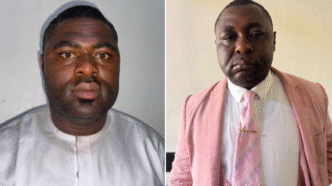Abuja, Nigeria — October 15, 2025 — The Department of State Services (DSS) has arrested two of its former personnel, Barry Donald and Victor Onyedikachi Godwin, over allegations that they used their previous positions in the Service to defraud unsuspecting members of the public.
The arrests mark the latest in a series of moves by Nigeria’s foremost intelligence agency to clamp down on identity fraud and the misuse of security credentials by ex-officers and impostors.
DSS Confirms Arrest
In a statement released on Wednesday, the DSS confirmed that the two men, who were dismissed from the Service some time ago, were taken into custody after investigations revealed that they had been using the DSS name and credentials to scam individuals and organizations.
The DSS described both suspects as “disgraced former staff” who had “no official or informal ties with the Service” and warned Nigerians to be cautious of anyone claiming to represent the agency without proper verification.
According to security sources, the arrests were carried out following several months of surveillance and intelligence-gathering after multiple complaints were lodged by citizens who said they had been defrauded by men claiming to be DSS operatives.
Profiles of the Suspects
Barry Donald
Barry Donald was reportedly dismissed from the DSS for misconduct several years ago. Since his dismissal, he is alleged to have engaged in fraudulent schemes, impersonating a serving security officer to extort money from members of the public.
He allegedly introduced himself to victims as a “senior DSS agent” capable of helping them secure jobs, government contracts, or sensitive clearances — but only after collecting large sums of money.
According to investigators, several victims fell for his deception because of his knowledge of DSS operations and his possession of forged identity cards bearing the Service’s insignia.
Victor Onyedikachi Godwin
Similarly, Victor Onyedikachi Godwin, also a dismissed staff member of the DSS, is accused of using the Service’s name to commit fraud. He reportedly operated across multiple states, contacting victims with promises of assistance in recruitment processes, business approvals, or conflict mediation.
The DSS stated that Godwin “has no connection whatsoever with the Service” and that all activities he conducted under the DSS name were illegal. He was arrested after a coordinated intelligence operation that traced his communications with victims to multiple fraudulent transactions.
How the Scam Worked
Preliminary investigations revealed that both men used similar methods in carrying out their scams. They allegedly targeted individuals seeking jobs, political appointments, or government favors, presenting themselves as insiders capable of facilitating such access.
In several documented cases, they demanded money under the pretext of “processing fees” or “clearance payments.” Victims reportedly transferred large sums to personal accounts provided by the suspects, believing they were dealing with authentic government officials.
Security investigators believe the two men may have operated both independently and in collaboration at different times. They are also suspected of having accomplices who helped them identify potential targets and manage communication channels.
The DSS stated that additional suspects are being interrogated as part of a broader investigation into impersonation rings exploiting the identities of security personnel.
Official Warning from the DSS
The DSS emphasized that both Barry Donald and Victor Onyedikachi Godwin had long been dismissed from the Service and were acting entirely on their own. The agency warned members of the public to avoid dealing with individuals who claim to represent the DSS unless their identities are verified through official channels.
The Service further reminded citizens that it does not request money, gifts, or favors for employment, contract approvals, or any official service. Any such demand, the agency stated, is a clear sign of fraud.
In its advisory, the DSS also cautioned that impersonation of security officers is a serious criminal offense under Nigerian law and that offenders would be prosecuted to the fullest extent.
Pattern of Security Impersonation in Nigeria
The case of the two former DSS staff highlights a recurring challenge facing Nigeria’s security community — the impersonation of law enforcement officers. Criminals posing as members of the police, army, immigration, or DSS frequently exploit public trust and fear to extort money or commit fraud.
Such incidents undermine public confidence in legitimate institutions and create an atmosphere of mistrust between citizens and law enforcement agencies.
In recent years, there have been multiple reports of job seekers and business owners falling victim to scammers who promise them government placements or security protection in exchange for payments.
Analysts say that the involvement of former security personnel in such scams makes the problem more complex, as these individuals often understand internal procedures and know how to convincingly present themselves as genuine operatives.
Legal Consequences
Legal experts have noted that the suspects could face charges of impersonation, obtaining money under false pretenses, conspiracy, and fraud. Each of these offenses carries significant prison terms under Nigerian law.
The Criminal Code and the Cybercrime Act both prescribe severe penalties for the use of fake identities or credentials to defraud others. If convicted, the suspects could face jail sentences ranging from seven to twenty years, depending on the nature of the evidence and the extent of financial loss suffered by their victims.
The DSS has confirmed that both suspects will be handed over to appropriate law enforcement authorities for prosecution once investigations are completed. The Service added that it is working closely with the Ministry of Justice to ensure that the case is fast-tracked in court.
Public Reaction
The arrests have generated widespread reactions from Nigerians, particularly on social media, where citizens expressed relief that the impostors had been caught. Many praised the DSS for its swift response but urged the agency to strengthen its public awareness campaigns to prevent similar incidents.
Civil society organizations have also called for the DSS to publish the names and photographs of the suspects to alert the public and assist victims in identifying the individuals who may have defrauded them.
Others urged the Service to review its post-employment tracking system to ensure that dismissed officers no longer have access to official identification or sensitive information that could be exploited after their exit.
DSS to Tighten Internal Controls
In response to public concern, the DSS has announced plans to strengthen its internal control mechanisms. This will include more rigorous retrieval of official materials such as identification cards, uniforms, and communication devices from dismissed or retired officers.
The agency is also expected to launch a nationwide verification platform where citizens can confirm the identity of any DSS operative before engaging in business or communication with them.
Security analysts have described this as a welcome development that could significantly reduce cases of impersonation and restore public confidence in the Service.
Broader Implications
The case of Barry Donald and Victor Onyedikachi Godwin raises important questions about post-service accountability and ethics among Nigeria’s security personnel. Experts say the DSS must not only prosecute offenders but also review the circumstances that allowed such misconduct to persist undetected for a period.
There are also concerns that similar cases could exist in other security agencies where dismissed or retired officers continue to use old credentials to deceive the public.
The Nigerian government has been urged to create a centralized database of all dismissed security personnel across the country to prevent them from gaining unauthorized access to sensitive information or impersonating active officers.
What Happens Next
Both suspects are expected to face court in Abuja following the completion of their interrogation. The DSS has encouraged any individuals who may have fallen victim to the suspects to come forward with information or evidence that could assist in prosecution.
Investigators are reportedly examining the suspects’ digital communications, bank accounts, and personal networks to trace the full extent of the fraud and recover stolen funds.
The DSS reiterated that the arrests demonstrate its commitment to maintaining the integrity of Nigeria’s intelligence community and protecting citizens from criminal elements posing as security operatives.
Conclusion
The arrest of former DSS officers Barry Donald and Victor Onyedikachi Godwin represents a strong message from Nigeria’s intelligence community: no one, regardless of past affiliation, is above the law.
By taking firm action against individuals accused of exploiting their former status for fraudulent gain, the DSS has reaffirmed its determination to preserve the integrity of national security institutions and protect citizens from deceit.
As investigations continue, Nigerians are being urged to remain vigilant, verify the identity of anyone claiming to represent security agencies, and promptly report suspicious individuals to the authorities.
This latest case serves as a reminder that the fight against impersonation and fraud requires both institutional vigilance and public cooperation to ensure that trust in the nation’s security services is not undermined by those who abuse it.














